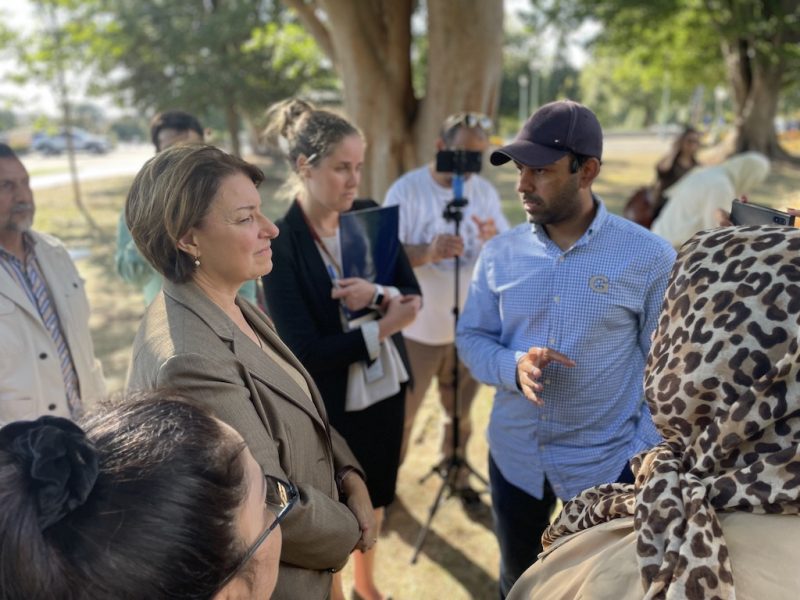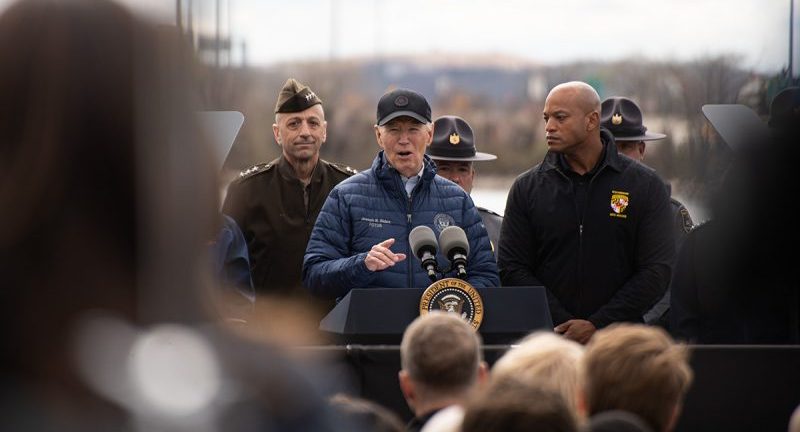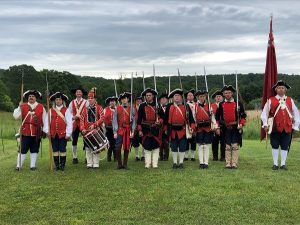Regional News
Afghan evacuees press for bill that could help give them US legal status
WASHINGTON – For 105 days, beginning in December 2021, Afghan-American Safi Rauf lived in an 8×8-foot cell in Taliban-controlled Afghanistan with few connections to the outside world.
Now, he is running a 24-hour “fireguard” with dozens of other volunteers outside the United States Capitol to raise support for the Afghan Adjustment Act.

Sen. Amy Klobuchar, D-Minnesota, meets last week with a group of supporters holding a “fire watch” outside the United States Capitol in support of the Afghan Adjustment Act. (Eve Sampson/Capital News Service)
The bipartisan bill, introduced in both the House and the Senate, would provide Afghans who worked with the United States during the 20-year war in Afghanistan a clear path to legal residency.
The Afghan Adjustment Act was not included in the stopgap spending bill to fund the federal government after Friday. Supporters hope it will be included in the upcoming defense policy bill or an expected continuing resolution in December.
The Department of Homeland Security reports that approximately 82,000 Afghans have been evacuated to the United States since the 2021 withdrawal from Afghanistan and the Taliban’s rise to power.
Most evacuees live in this country under humanitarian parole status, which normally lasts two years. The bill would allow Afghans who pass additional vetting to apply for permanent legal status.
Rauf, a Navy reservist and the founder and president of Human First Coalition, a nonprofit that works to provide humanitarian aid and resettlement assistance to vulnerable Afghans, estimates his organization has evacuated over 10,000 people from Afghanistan in the last year.
The nonprofit chartered several flights after U.S. forces left Afghanistan. But when visiting the country for a planning trip last December, Rauf and his brother, Anees Khalil, who also works for Human First Coalition, were taken hostage by the Taliban and tortured.
“You cannot prepare for something like that,” he told Capital News Service. “Every day was incredibly hard. Initially, they put us in a basement that was not really fit for living. It was just a basement that did not have any ventilation, any blankets, any mattresses.”
Rauf said he and his brother were forced to go a month without showering while wearing the same clothes.
Bathroom breaks were scheduled and supervised, and meals were scarce – meager portions of tea, rice, beans, and bread. Rauf said his captors left the lights on all day. He spent most of his time lying down, marking a calendar he scrawled on the wall.
The brothers eventually attempted multiple hunger strikes to protest their treatment.
Eventually, the U.S. government secured the brothers’ release on April 1.
“Our world basically stopped on December 18,” Rauf said. “When I got out on April 1st, the world had moved on.”
Still, Rauf cannot slow down. He is haunted by the hundreds of calls he still receives from Afghans begging for help.
“I’m still getting chaotic messages from people who are scared for their lives,” he said. “The administration is doing their best, but how do you work with a de-facto authority that doesn’t recognize human rights?”
In folding chairs outside the Capitol building, former Afghan pilots and parliamentary members are among the volunteers who help themselves to traditional Afghan food while petitioning for the legislation’s passage. The American flag waves alongside the Afghan flag in front of a folding table with information about the bill.
On Thursday evening, Sen. Amy Klobuchar, D-Minnesota, who introduced the bill in the Senate, came out to the lawn for an impromptu visit with the group.
Addressing the volunteers, who included members of the Georgetown Institute for Women, Peace, and Security, Women for Afghan Women, and various former military members, Kloubacher thanked the group for continuing to campaign for Afghans.
“I thank you for sitting out here on the lawn to remind our colleagues that promises made, promises kept,” she said, her hand upon the shoulder of an Afghan woman. “And there (are) promises made to the people who stood on the side of democracy and freedom with our military in Afghanistan.”
By EVE SAMPSON
Capital News Service
Regional News
Attempts to Give Fetuses Personhood Status Seen Across State Legislatures
“Fetal personhood” has emerged as the next step of the anti-abortion movement.
By amending state constitutions or passing new laws, several state legislatures across the country are attempting to give fetuses the rights and protections of any human under the law.
Legislation has been proposed in at least 13 states and at the federal level. The states include Georgia, Idaho, Indiana, Kansas, Massachusetts, Missouri, New Hampshire, New York, South Carolina, Oklahoma, Vermont, Virginia and West Virginia.
While language differs from state to state, the idea remains the same: a fetus is redefined as an “unborn child” and will be considered human for legal purposes.
In addition to “fetal personhood” bills, other states are considering legislation that identifies a fetus as an “unborn child” or uses language that indirectly personifies a fetus, including criminalizing abortion as assault or murder or requiring child support payments beginning at conception. Among those states are Alabama, Florida, Hawaii, Kansas, Missouri, North Carolina, Oklahoma, Rhode Island, and South Carolina.
While the reality of these bills becoming law is relatively low, they come as part of a wave of legislation to further restrict abortion access following the Dobbs decision from the Supreme Court in June 2022. The decision overturned Roe v. Wade, which had given constitutional protections to abortion access.
National organizations, such as the National Association of Christian Lawmakers (NACL), have pushed these “personhood” bills as well as other anti-abortion legislation in legislatures nationwide. The NACL has had a direct influence on legislation in states like Missouri.
Jason Rapert, founder and president of NACL, said that the faith-based organization’s first piece of model legislation was the Heartbeat Act, which outlaws abortion after a fetal heartbeat is detected. Following the adoption of this legislation in numerous states and the Dobbs decision, the NACL shifted its focus to life-at-conception legislation.
“In this country, up until 1973, it was well understood that those babies were human beings … It’s inherent as a part of many of these bills because it is protecting those lives,” Rapert said.
But while anti-abortion advocates say these bills would protect the “unborn,” abortion rights advocates say that these “personhood” bills would not be beneficial to pregnant people. Taylor Morton, a lobbyist and policy analyst for Planned Parenthood Great Plains Votes, said that anti-abortion bills are especially prevalent this legislative session.
“The effort to establish “fetal personhood” is a disingenuous tactic used by those who oppose comprehensive sexual, reproductive healthcare,” Morton said. “It elevates the rights of a fetus to be equivalent, or even superior, to those of a pregnant person.”
Morton said that sometimes, these bills can be deceiving and seem to be promoted as beneficial to women.
“On the surface, these bills appear to support pregnant people and families,” Morton said. “But if you look closer, the bills are nothing more than an attempt to further an anti-abortion agenda by codifying that fetal personhood language.”
Efforts Across State Legislatures
Kansas has seen many bills that would make abortion more difficult to access despite voters rejecting an amendment in 2022 that would have said there was no right to an abortion in the state.
Senate Bill 425 and House Bill 2653 in Kansas would establish an unborn fetus as eligible for child support.
Bill 2653 passed through the House 83-40, with mostly Republican support, at the end of March. The bill was also introduced and received in the Senate, which referred it to the Senate Committee on Federal and State Affairs. Because the legislature is taking its April hiatus from bill hearings, the bill will not pass through the committee and on to the Senate during this legislative session.
Sen. Ethan Corson, D-Prairie Village, said that bills are not labeled as “fetal personhood” because they would be met with more resistance.
“The concept is embedded in a different, or less clear purpose,” Corson said.
He said he could see these types of bills potentially leading to limited abortion access.
“If you say that an unborn fetus has the same legal rights as a pregnant person, then that calls into question existing laws around reproductive healthcare and access to abortion,” Corson said.
In Florida, the state Supreme Court – five of the seven justices were appointed by Gov. Ron DeSantis – ruled to allow a proposed constitutional amendment guaranteeing abortion rights on November’s general election ballot.
The same day, the court also ruled that the state’s newly enacted ban on abortions after six weeks can take effect May 1.
This year, the state’s legislature considered, but did not pass, a bill that would effectively ban all abortions unless a mother’s life was in danger. Similar to so-called “fetal personhood” proposals in other states, the bill declared that “a person exists from the moment of fertilization” and called legal abortions “a crime against humanity.”
The “fetal personhood” bill, introduced by Republican Reps. David Borrero of Doral and Mike Beltran of Apollo Beach, languished in committees without a hearing or formal vote.
The ban on abortions after six weeks, before many women realize they are pregnant, includes an exception to save the life of the mother. Abortions for pregnancies involving rape or incest would be allowed until 15 weeks of pregnancy, as long as a woman provides documentation, such as a restraining order or police report.
But on the same day, in another case, the Florida Supreme Court agreed to allow voters in November to decide whether to guarantee abortion rights in the state, effectively overturning both the 15- and six-week abortion bans if 60% of voters approve under a new constitutional amendment.
Republicans have moved quickly to campaign against the abortion vote already, calling the amendment deceptively written and an “extreme, unlimited abortion” plan. The amendment would guarantee women the right to abortions before fetal viability, generally recognized around 24 weeks.
In Missouri, efforts to personify fetuses have been seen last legislative session and this session. Sen. Mike Moon, R-Ash Grove, and Rep. Brian Seitz, R-Branson, have proposed similar bills that would grant a fetus the same rights and privileges of any Missouri resident, beginning at conception.
More indirect efforts to establish “personhood” have included a bill from Rep. Raychel Proudie, R-Ferguson, that allows child support to be requested beginning at six weeks from conception. Reps. Michael Burton, D-Lakeshire, and Dean Van Shoiack, R-Savannah, have proposed identical bills that would prevent “unborn children” from being considered employees for civil action purposes.
The bill from Van Shoiack is the only one that has seen any traction this session, the rest have been stuck in committees or waiting to be referred to a committee. Van Shoiack’s bill was passed out of committee and is awaiting floor action.
Simultaneously, initiative petition acts have picked up steam this year – both to ban abortion and to enshrine abortion rights in the state constitution.
With abortion-related initiative petition efforts growing, the Missouri legislature has also made progress in the fight to limit the ability of Missourians to change the state constitution. Progress has been slowed by Democratic filibusters and disagreements over “ballot candy.”
In this case, it refers to provisions that state that anyone who isn’t a Missouri resident and a U.S. citizen is barred from voting on constitutional amendments and that constitutional amendments funded or sponsored by governments of foreign countries or foreign political parties are unlawful. This is referred to as “ballot candy” because these provisions already exist in federal law.
The Next Steps of the Anti-Abortion Fight
Rapert of NACL, the organization promoting fetal person legislation, said the next step will be working to outlaw abortion pills.
In Virginia, which is surrounded by several states where abortion is entirely illegal or severely restricted and has become a refuge for those seeking abortions in the South, lawmakers efforted to protect access to contraceptives.
Virginia Gov. Glenn Youngkin amended bills to codify such access and provide coverage through health insurance.
Senate Bill 237 and House Bill 609 ensured health care providers the right to provide contraceptives and contraception-related information and allowed enforcement of the provisions through the attorney general’s office.
Youngkin’s changes make the bills a public policy “suggestion” rather than law, according to the bill’s Senate patron.
The governor “continues to support access to contraception while ensuring the protection of constitutional rights,” Youngkin’s press secretary, Christian Martinez, recently stated to Bloomberg News.
The governor’s amendment to the health insurance bill allows organizations to opt out of coverage based on religious and ethical beliefs. Lawmakers voted to reject his suggestion.
Reporters Rylie Oswald Al-Awhad of the KU Statehouse Wire Service, Serra Sowers of Fresh Take Florida and Emily Richardson of VCU Capital News Service contributed to this report. Murphy reports for the Missouri News network.
By EMMA MURPHY
Missouri News Network
Regional News
RideSmart Introduces New Commuter Bus Service from Waterloo Park and Ride Lot
RideSmart is thrilled to announce the launch of an exciting new commuter bus service starting Monday, May 13, 2024. This service will operate Monday through Friday, offering convenient transportation from the Waterloo Park and Ride lot at 1812 John Mosby Hwy, Winchester, VA, to Rosslyn, VA, and Washington, DC.
Commuters in the region can now enjoy a stress-free journey to their destinations, thanks to RideSmart’s comfortable and eco-friendly buses. With spacious seating, onboard amenities, and complimentary Wi-Fi, passengers can maximize their travel time while feeling proud of their contribution to the environment by reducing their carbon footprint.
To celebrate the inauguration of this new service, RideSmart warmly invites you to a ribbon-cutting event on Wednesday, May 15, 2024, at 5:15 p.m. This event, held at the Waterloo Park and Ride lot, will feature remarks from local officials, RideSmart representatives, and, most importantly, community members. Your presence is highly valued, and we look forward to celebrating this milestone with you.
“We’re excited to introduce our new commuter bus service, providing residents with a convenient and sustainable transportation option,” said Becky Sandretzky, Commuter Assistance Program Coordinator at RideSmart. “We look forward to serving the community and beyond, helping commuters reach their destinations efficiently and comfortably.”
Don’t miss this opportunity to be part of the RideSmart journey! Let’s roll into a better commute!
Regional News
Baltimore Port closure creates uncertainty for businesses
Before the bridge’s collapse, Johnson wasn’t aware that the Port of Baltimore was a main hub for plywood. He worries how this may affect his furnishing business but also how the port’s closure may impact Baltimore’s small business economy.

Su Casa Furniture owner Nicholas Johnson is concerned that plywood, a main import of the Port of Baltimore, might become scarce during an extended closure of the port. (Emily Condon/Capital News Service)
“My bigger concern is for how the ‘temporary’ adjustments to logistics may stick and become permanent,” Johnson, 39, said in an email. “Because of the timeframe for complete recovery, it is conceivable that many businesses that make arrangements to utilize NY, Philly, Norfolk, Wilmington, and Richmond in the short term may stick with it.”
Many other Baltimore businesses share his concerns. The March 26 collapse of the Key Bridge left six dead and left much of Baltimore’s port blocked for imports and exports. Some 51,000 people rely on the port, either directly or indirectly, for their jobs. Because of this threat to the economy, Governor Wes Moore has approved $60 million in temporary assistance to workers and businesses.
Some high-profile companies immediately shifted gears: first, Royal Caribbean International moved its Vision of the Seas ship to sail from the port in Norfolk, Virginia. Then, CSX Corp., a major freight rail company, decided to add a new train route to bring supplies from Baltimore to New York. The U.S. Small Business Administration said more than 1,000 businesses in the Baltimore area have applied for emergency loans following the bridge collapse.
For trucking companies based in the city, the port closure resulted in major shifts in their operations and forced some drivers out of work. Universal Intermodal Services Inc.’s Dundalk location currently has at least 12 truckers out of work, according to fleet manager RJ Martin.
“It’s really screwed up the trucking market in this whole area as guys are no longer working in this area,” Martin said. “They’re having to go somewhere else or just be out of work and try and collect unemployment – which not everyone will be approved for.”
Martin is hopeful that once the Baltimore channel is cleared and the port reopens, operations for Baltimore shipping companies will return to normal. The U.S. Army Corps of Engineers said it hopes to have the Port of Baltimore partially reopened by the end of April and fully open by May.
Other businesses don’t face such a severe economic impact, but they consider the loss of the Key Bridge as an important symbolic moment for the community. For Brandy Teresi, 48, co-owner of Robbie’s Bar and Grill in Sparrows Point, the Key Bridge was “a part of your identity and who you are as an individual, which is weird because it’s just a bridge.”
The only small immediate impact for Robbie’s Bar and Grill has been rerouted deliveries. One quirk: the supplier of the bar’s CO2 tanks, which pump the beer taps and soda machines, needs to go around the city because regulations don’t permit the tanks in the Harbor Tunnel on Interstate 895, Teresi said.
Other businesses across the city are still navigating the uncertainty that comes with the collapse. Canton-based Mama’s on the Half Shell has not experienced any direct economic impacts. Still, some customers from Anne Arundel County have a longer drive to the restaurant, said Maurico Guevara, a veteran employee at Mama’s. The restaurant planned to hold a fundraiser on April 10 and donate a portion of their profits to victims of the collapse, he said.
Megan Gardner, marketing director for the restaurant group that owns Mama’s, doesn’t predict any problems with food shipments since they obtain their food from local suppliers. The biggest impact is emotional.
Regional News
The IRS is Testing a Free Method to Directly File Taxes. But Not Everyone is Thrilled
WASHINGTON — Many U.S. taxpayers in a dozen states for the first time can electronically file their federal returns directly to the Internal Revenue Service for free — but critics insist the new federal benefit is not needed and will even harm both users and states.
More than 50,000 taxpayers in Arizona, California, Florida, Massachusetts, Nevada, New Hampshire, New York, South Dakota, Tennessee, Texas, Washington and Wyoming have so far used the new online IRS Direct File program this tax season, according to the agency.
The free alternative to potentially costly private tax filing software rolled out in mid-March for the 2023 filing season. It is only available for those with W-2 income or simple credits and deductions, like the child tax credit or student loan interest.
The IRS estimates that 19 million taxpayers are eligible to use the new program in advance of the April 15 tax filing deadline.
But opponents argue the government Direct File program is a waste of resources and will snag business from professional tax preparers. They say it will confuse taxpayers who are accustomed to automatically filing their federal and state returns together through private software.
Some states also claim it will cost them revenue and increase what they have to spend on collections from taxpayers who owe money to their states.
The IRS program is purposefully small for now. The agency said in a launch-day release that it’s following “best practices for launching a new technology platform by starting small, making sure it works and then building from there.”
The pilot program “is almost tailor-made for students and young people with simple tax situations,” IRS Commissioner Danny Werfel said in late March, encouraging people to visit the new directfile.irs.gov.
The White House is celebrating the launch as a win for President Joe Biden, who in 2022 along with a Democratic-led Congress authorized its funding to jumpstart the program as part of the Inflation Reduction Act.
The progressive Economic Security Project estimates that if the program scales up, it could eventually save the average taxpayer up to $160 annually in tax prep costs. Assuming broad public adoption, that could add up to Americans saving $11 billion a year in filing fees and time.
The organization also estimates low-income households could gain up to $12 billion in unclaimed federal tax credits, and that the IRS would see a return on investment of more than $100 per federal dollar spent on the program due to less paperwork and fewer errors.
Roxy Caines, director of the Get It Back campaign, said Direct File could increase tax participation, particularly for low-income households.
“Having an accessible way to file taxes is really important because of the high cost of tax preparation as well as the arduous process. It’s often viewed as intimidating,” said Caines, who runs the financial literacy and tax credit advocacy campaign by the left-leaning Center on Budget and Policy Priorities.
‘Unnecessary and unconstitutional’
But not everyone is on board.
When Werfel appeared in February before the U.S. House Committee on Ways and Means, Republican Chair Jason Smith of Missouri described the program as a “scheme the American people didn’t ask for.”
In January, 13 Republican attorneys general sent a letter to Treasury Secretary Janet Yellen opposing “the unnecessary and unconstitutional efforts to empower the Internal Revenue Service with the expansive authority to prepare and file tax returns for all taxpayers.”
“American taxpayers do not want to invite the proverbial fox into the hen house,” wrote the officials, led by Montana Attorney General Austin Knudsen.
Attorneys general from Georgia, Idaho, Iowa, Louisiana, Missouri, Nebraska, South Carolina, Tennessee, Texas, Utah, Virginia and West Virginia co-signed it.
The officials wrote that a program for taxpayers to directly file with the IRS at no cost “needlessly threatens” the livelihoods of tax preparers.
“Every year, tens of millions of taxpayers file their taxes for free with help from existing programs or online software. Additionally, millions of Americans work with small businesses in our states to file their taxes at an affordable cost, including both independent tax preparation services and local accountants. They choose to do so because they want an advocate in their corner who will represent their interests against the IRS bureaucracy,” they wrote.
The IRS did not respond to a request for comment about the criticism.
Pete Sepp, president of the National Taxpayers Union, a fiscally conservative organization that advocates for simplifying the tax code, told States Newsroom the project has been “dramatically oversold” and is being piloted in “some very easy places,” including states that don’t collect their own income tax.
Money for the IRS would be better spent on improving customer service, he argues.
“Every single penny they can scrounge up from other places needs to be poured into that effort, right? Now, in our opinion, designing a portal for direct file that is underpowered and is competing with other services is just not a priority,” he said, referring to the 22-year “Free File” arrangement the IRS has had with select private companies.
So what about Free File?
Today, the vast majority of taxpayers file electronically, according to IRS data. Of the 160 million individual federal tax returns that the IRS processed in 2022, 150.6 million, or 94%, were e-filed. Of those, just under 3.3 million used what’s been criticized as an opaque and complicated electronic Free File program.
Free File dates back to the early 2000s, when the idea of e-filing was just budding, and the government had no such program in place.
President George W. Bush’s administration was exploring the possibility of a free direct file portal through the IRS website.
At the time the agency was struggling after failed modernization efforts, and a public-private partnership with the burgeoning tax preparation software companies became an appealing option.
“The tax companies just said, ‘Well, we got a deal for you,’” recalls Nina Olson, who served as the National Taxpayer Advocate for the IRS from 2001 to 2019.
“And at that time, I was very suspect of the deal. I said at the time that they’re going to find themselves in 20 years, that you know, tax companies would pull out and you would have a patchwork of services available to people,” Olson, who now runs the nonprofit Center for Taxpayer Rights, said in an interview with States Newsroom.
What began in 2002 was an agreement between the IRS and a group of private tax prep software companies, under the name Free File Alliance, to offer free federal tax returns to those under a certain income threshold. In 2023, that annual earnings threshold was $79,000 or less.
Taxpayers who earn above that income threshold have the option to complete their federal returns for free, unguided, using fillable PDF tax forms.
The just over two-decade-old program has been scrutinized for not reaching the taxpayers who most need a free filing option and for not providing a better user experience.
A 2019 Treasury Inspector General for Tax Administration report described the program as “fraught with complexity and confusion.”
The inspector general found that in 2018 only 2.5 million of the 104 million taxpayers eligible for Free File actually used it.
About 34.5 million of those Free File-eligible taxpayers used one of the alliance companies’ commercial software options, and a likely 14 million of them paid to e-file their federal returns, the report found.
The low number of Free File users likely was because an estimated 9 million eligible taxpayers were unaware that they had to access the Free File software options via the IRS website.
Those who, for example, searched the web and found one of the IRS partner companies’ websites were “not guaranteed a free return filing,” and subsequently susceptible to advertising for potentially costly add-ons like “audit defense,” the report found.
Investigative reporting in 2019 by ProPublica revealed deliberate tactics to cloud the Free File program by Intuit, maker of TurboTax, one of the Free File Alliance’s largest partners.
Terms between the IRS and Free File Alliance initially included a commitment from the agency to not develop its own free online filing program. In exchange, the partner companies agreed to limit advertising and add-on solicitation on their free file web pages.
In 2019 the IRS dropped the prohibition on developing its own program. Limits on company marketing and solicitation for add-on products continued as part of the agreement — though Intuit would eventually have to pay for breaking its commitment.
H&R Block and Intuit respectively left the Free File Alliance in 2020 and 2021. Together they served about 70% of eligible Free File taxpayers in 2019, according to a 2022 Government Accountability Office report that recommended the IRS develop additional options for taxpayers to file for free.
Acknowledging the opposing viewpoints on whether the IRS should create, or could handle, its own program, the report concluded the agency “should work to manage the risk of taxpayers having fewer options to electronically file their federal taxes for free.”
In 2022, Intuit settled with attorneys general from across the U.S., agreeing to pay $141 million to Intuit TurboTax customers who ended up buying services that should have been free to them.
Today there are eight companies in the Free File Alliance, with differing income and tax situation criteria. All are listed on the IRS website.
Olson said she doesn’t view the IRS Direct File pilot as a competitor to the already existing Free File partnership. Rather, it’s “one more component of a robust tax online taxpayer account,” she said.
“This is what countries do around the world. We’re so far behind,” Olson said. “There’s a response to folks who say ‘The government doesn’t need to do this’ or ‘There’s no interest in this product.’ Regardless of whether there’s interest in the product, it’s a government obligation.”
Congressional mandate
Among the tens of billions of dollars Congress authorized for the IRS in the Inflation Reduction Act, $15 million was earmarked for exploring the possibility of an IRS-run direct federal tax filing system.
Specifically Congress mandated the agency to use the money to survey taxpayers’ wants and needs, obtain a third-party opinion, and report back to lawmakers on the costs to create and run such a program.
In its third-party review, the left-leaning think tank New America assessed that a successful IRS-run Direct File program “depends critically” on whether the agency prioritizes the project and begins with limited testing before building up.
The organization estimated that development, staffing, infrastructure and customer service for a scaled-up platform would cost the IRS annually anywhere from $22 million to $47 million if 1 million taxpayers use a Direct File program, and up to $126 million to $213 million in the event that 25 million taxpayers jump on board.
New America also recommended the IRS consider the importance of customer service, data privacy and taxpayers’ habits of filing federal and state returns all on one platform — one of the main concerns from critics.
Ayushi Roy, deputy director of New America’s New Practice Lab, which led the review, told States Newsroom she’s been talking to taxpayers using the Direct File pilot and “broadly speaking, we’re finding that filers are really landing on either ‘Wow,’ or ‘it didn’t include me for now.’”
The group will conduct its own analysis of the IRS trial run, particularly focusing on the experience for Spanish-speaking filers.
As for taxpayer interest, the IRS found that 72% of survey respondents said they were “very interested” or “somewhat interested” in a free IRS-provided tool to prepare and file federal taxes.
The survey conducted in 2022 by MITRE, a nonprofit that runs federally funded research and development centers, also found that a top reason cited by 46% of those interested is that they would rather give their financial data to the IRS than to a third party.
An October 2023 report from the Treasury Inspector General for Tax Administration took issue with the design of the survey, warning that the interest level may be “overstated” because the survey did not include a “neutral” option for respondents to choose.
However, the largely Democrat- and progressive-aligned international polling firm GQR found in late January through early February that between 92% and 95% of taxpayers across political ideologies and income levels in Arizona, Florida, Georgia, New York and Texas support a free online IRS filing service.
Several state governments already offer free public electronic filing for state income tax returns, including Alabama, Kansas, Kentucky and Pennsylvania, which offer the service regardless of income level. Some states, like California and Iowa, have income thresholds for free filing.
States bite back
Despite the adoption of free public filing in some states, 21 state auditors, comptrollers and treasurers from 18 states sent a letter on March 25 to Yellen and Werfel expressing concern about the “serious harm” the IRS Direct File program will cause and urging them to “shut down” the service.
“Taxpayers are not the only parties who will suffer from Direct File. States will suffer too. States will lose out on payments from Direct File taxpayers who owe state taxes but incorrectly assume that Direct File covers federal and state filings.
“States will then have to increase resources dedicated to collection efforts,” wrote the officials from Alaska, Florida, Idaho, Indiana, Iowa, Kansas, Kentucky, Louisiana, Mississippi, Nebraska, North Carolina, Ohio, Oklahoma, South Carolina, South Dakota, Utah, West Virginia and Wyoming.
According to the Treasury Department, taxpayers using the IRS Direct File pilot in Arizona, California, Massachusetts or New York are automatically directed to their state-supported tax filing websites. Those in Washington are sent to that state’s page to claim the Working Families Tax Credit.
The IRS could not provide a more specific figure of how many taxpayers have so far used Direct File, and its latest estimate stands at 50,000. Advocates say they expect to learn updated numbers as soon as a week after federal taxes are due on April 15.
by Ashley Murray, Virginia Mercury
Virginia Mercury is part of States Newsroom, a nonprofit news network supported by grants and a coalition of donors as a 501c(3) public charity. Virginia Mercury maintains editorial independence. Contact Editor Samantha Willis for questions: info@virginiamercury.com. Follow Virginia Mercury on Facebook and Twitter.
Regional News
Biden Pledges to “Move Heaven and Earth” for Speedy Bridge Rebuild
BALTIMORE — President Joe Biden pledged Friday to fight for federal funding to rebuild the collapsed Francis Scott Key Bridge, promising to “move heaven and earth” during a Friday visit to the disaster site.

President Joe Biden, standing next to Maryland Gov. Wes Moore, gives remarks at the Port of Baltimore on April 5, 2024, in the aftermath of the collapse of the Francis Scott Key Bridge. (Mathew J. Schumer/Capital News Service)
“We will do so with union labor and American steel,” Biden told a group of local officials and first responders gathered for his afternoon remarks at the Port of Baltimore.
That morning, Biden’s executive office had asked Congress to commit to fully cover the costs for rebuilding the bridge.
But a spokesperson for the House Republican majority declined to comment on Biden’s letter to the House Committee on Transportation and Infrastructure and the Senate Committee on Environment and Public Works. In an earlier statement, House Committee Chairman Sam Graves, R-Missouri, said that the committee needed to make sure they’re not “getting ahead of the facts.”
After Biden’s letter came out Friday, the conservative House Freedom Caucus issued conditions such as that some environmental and labor regulations be waived “to avoid all unnecessary delays and costs” if the federal government foots the bill.
Those signs of skepticism about the funding are raising worries among some Democrats.
“I was concerned about those remarks because they just don’t seem to meet the hour and the tragedy and the need,” Rep. Kweisi Mfume, D-Maryland, told Capital News Service on Friday. He said he plans to talk to Republicans about this on Monday.
Biden’s trip came almost two weeks after a cargo ship crashed into a pillar of the bridge, bringing down a giant portion of it and killing members of a construction crew who were working there at the time. Federal, state, and local officials have been scrambling since then to re-open a small channel of access to the busy Port of Baltimore and to remove the wreckage so that reconstruction can begin.
After the accident, Biden was quick to pledge full support from the federal government. His administration has granted Maryland Gov. Wes Moore’s request for $60 million in immediate federal aid for emergency work. These funds serve as an “initial down payment” to help Maryland manage disruptions to traffic and supply chains as well as start reconstructing the bridge, Shailen Bhatt, federal highway administrator, said in a press release.
On Friday, Biden announced grants for dislocated workers who were impacted by the collapse. His administration would ensure that the party responsible for the accident pays for the damage, Biden said.
“Your nation has your back,” Biden said. “We are going to get this paid for.”
A spokesperson for the Senate committee, chaired by Sen. Tom Carper, D-Delaware, said that Carper is reviewing the request and speaking to his colleagues about it.
“He is committed … to supporting all federal efforts to get both the port operational and the bridge restored,” the spokesperson said.
The U.S. Army Corps of Engineers is working on clearing wreckage along the Fort McHenry Channel and plans to open a one-way limited access channel in and out of the Port of Baltimore at the end of April. The engineers are aiming to restore port access to full capacity by the end of May.
Concerns about environmental impacts of the crash remain. Fourteen ship containers holding hazardous materials were damaged in the accident, according to officials.
The Maryland Department of the Environment has analyzed the water in the affected area and found no contaminants on the day the bridge collapsed.
“Sampling will continue indefinitely every few days as needed,” said Jay Apperson, deputy communications director.
By LISA WOELFL AND MATHEW J. SCHUMER
Regional News
Distress Call Precedes Disaster at Baltimore Bridge
BALTIMORE – A container ship leaving the Port of Baltimore sounded a mayday call just before plowing into the Francis Scott Key Bridge in the early morning hours Tuesday, collapsing a fixture of the local landscape and prompting a rescue mission for an overnight road crew at work on the bridge at the time of the crash.

A view of the Key Bridge, which collapsed early Tuesday morning after it was struck by a ship. (Sapna Bansil/Capital News Service)
The last-minute warning likely saved countless lives by alerting officials to divert traffic away from the bridge, but rescue teams spent the entire day searching for at least six individuals who were part of the construction crew.
Maryland Gov. Wes Moore, who arrived in Baltimore Tuesday morning, said those aboard the ship alerted authorities they had a “power issue” shortly before the collision.
As a result of the last-minute warning, “local authorities were able to close the bridge to traffic before the bridge was struck, which undoubtedly saved lives,” President Joe Biden told reporters later that afternoon.
Several road workers were fixing potholes on the bridge at the time of the collapse, according to Paul J. Wiedefeld, Maryland secretary of transportation. Two people were rescued from the water shortly after the collision, officials said.
While the investigation is just beginning, authorities said all signs point to an accident. An FBI spokesperson said there is no evidence this was an act of terrorism. The bridge, which opened 47 years ago this week, was fully up to code, according to Moore.
“To hear the words that the key bridge has collapsed, it’s shocking,” the governor told reporters. “The words that the key bridge is gone, it still shakes us …This is not just unprecedented, it’s heartbreaking.”
Biden addressed reporters Tuesday afternoon, calling on Congress to support reconstruction of the bridge with federal funding. The bridge is crucial for travel through Baltimore and throughout the country’s northeast corridor, he said, while the Port of Baltimore functions as a critical part of the nation’s economy.
“We’re going to spend all the federal resources (the state) needs as we respond to this emergency. I mean, all federal resources,” said Biden. “We’re going to reopen the port and rebuild the bridge as soon as humanly possible.”
Baltimore City Fire Chief James Wallace said the ship struck a column of the bridge in the 1 a.m. hour, causing a major portion of it to snap. Entrances to the bridge were immediately shut down and traffic on this span of I-695 was redirected through the I-95 and I-895 tunnels.
Rescue efforts were then coordinated by several first responding agencies in the city of Baltimore and Harford County, along with the U.S. Coast Guard.
One patient from the incident was taken to the R Adams Cowley Shock Trauma Center at the University of Maryland Medical Center, a hospital spokesperson confirmed with Capital News Service.
Synergy Marine Group, the company responsible for the ship’s management, said in a statement that all crew members and two pilots were accounted for and no injuries were reported.
Dundalk residents gathered along the highway leading to the bridge Tuesday afternoon. Many of them had woken up to the sound of rumbling in the early hours of the morning.
Harvey Brice, 73, of Dundalk, said he heard “a tremendous noise.”
“It kind of trembled the house a little bit,” said Brice.
Amanda Peters, 44, of Dundalk, heard what she said “sounded like this long thunder, but it didn’t make sense. It didn’t sound like a normal sound from the port. It just was a constant like, it’s hard to describe it. It was so loud but it continued for so long.”
Camille Sims, 23, of Glen Burnie, who works in Baltimore and frequently drives the bridge, said she was awake and felt her house shake after 1 a.m.
“My house just started shaking a little bit. It wasn’t crazy, like earthquake shaking, it was just like moving and I was confused,” she said.
Several government officials issued statements in response to the incident.
“Having worked in that area most of my life, I understand the bridge’s vital role for Baltimore’s Port and commuters,” State Sen. Johnny Ray Salling, whose district includes the bridge, said in a statement. “Losing this bridge will devastate the entire area, as well as the entire East Coast. We depend on the Port of Baltimore for transportation, travel, and commerce.”
State House Republicans also released a joint statement, saying “while this horrendous incident will require a full investigation, right now our focus must be on the victims, their families, and making sure they get the care and services they need. We must also take a moment to acknowledge the bravery of our heroic first responders currently working on rescue efforts.”
An investigation into the incident is now in the hands of the National Transportation Safety Board, who will evaluate what the conditions of both the vessel and the bridge were leading up to the collision.
By Angelique Gingras, Steph Quinn, Sapna Bansil, Lydia Hurley, Tyrah Burris, Kiersten Hacker and Emma Tufo
Capital News Service











































































